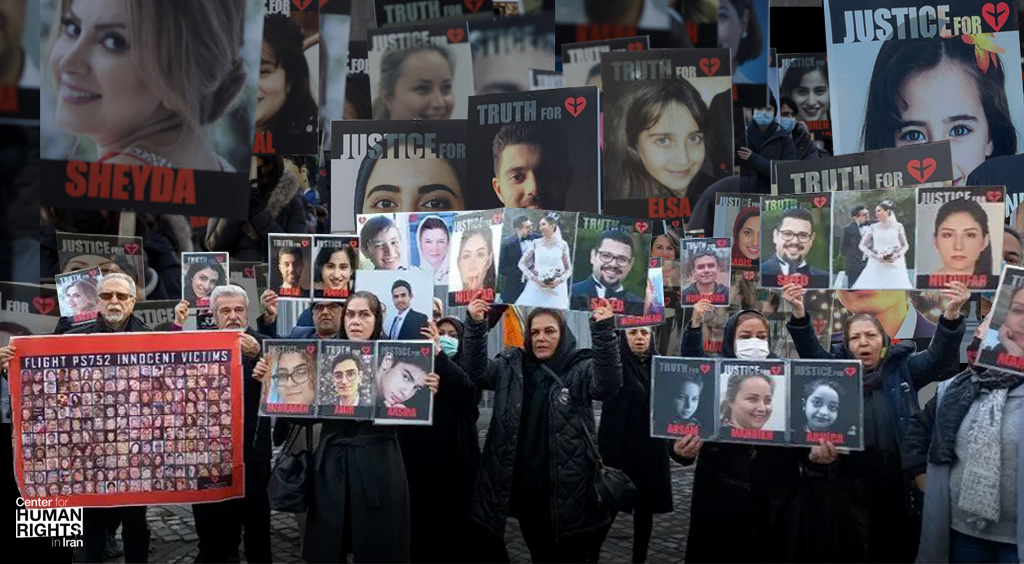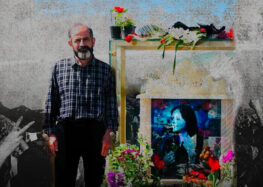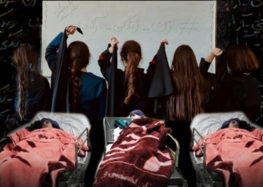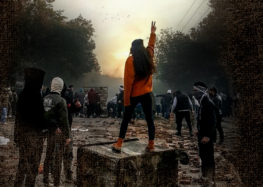Third Anniversary of Shooting Down of Ukrainian Passenger Plane, Still No Justice
 Canada, Sweden, Ukraine, and UK Call for Binding Arbitration
Canada, Sweden, Ukraine, and UK Call for Binding Arbitration
No One Held Accountable for IRGC’s Killing of 176 Passengers
January 6, 2023—Three years after the shooting down of Ukrainian Passenger Flight PS752 by Iran’s Islamic Revolutionary Guard Corps (IRGC), no Iranian officials have been held accountable for the missile attack that caused the death of all 176 people on board.
In the absence of any domestic accountability, the governments of Canada, Sweden, Ukraine, and the UK have called for the Islamic Republic to submit to binding international arbitration in the case, a call that the Center for Human Rights in Iran (CHRI) strongly supports.
“Three years after the tragedy, only five hearings have been held in Iran [the last on December 19, 2022] with no verdict issued—yet protesters who exercised their constitutional right to peaceful dissent have been quickly condemned to long prison sentences and have even been given the death penalty and executed,” said Saeid Dehghan, a prominent human rights lawyer with detailed knowledge of the case.
“The lack of any accountability or even minimal legal standards in this case exemplifies the total absence of justice or rule of law in the Islamic Republic, where high-ranking officials guilty of egregious crimes enjoy complete judicial immunity,” said CHRI Executive Director Hadi Ghaemi.
On January 8, 2020, Ukraine International Airlines Flight 752 was shot down minutes after taking off from Tehran’s Imam Khomeini International Airport by two missiles fired by the IRGC. The Islamic Republic denied it had fired the missiles for three days, and then admitted it had done so “by mistake.”
The families of the victims of Flight PS752 have sued Iran’s Supreme Leader Ali Khamenei, who is the commander-in-chief of the armed forces and has direct authority over the IRGC, as well as senior IRGC commanders, including Hossein Salami and Amir Ali Hajizadeh, and members of the Supreme National Security Council, notably Ali Shamkhani. However, in the domestic trial, only 10 low-ranking military officers are standing accused.
So-called Trial is a Travesty of Justice
The trial to date has been a sham. None of the lawyers chosen by the plaintiffs have been allowed to attend in order to present the complaints. The defendants’ full names and images have not been published, and in court they are seated in the first row so that their faces cannot be seen. The court hearings have been closed to the public, and no independent observers have been allowed to attend.
“The court has not acted without bias,” added Dehghan. “Images of the country’s senior officials on either side of the judge’s bench make it clear they are the ultimate victors of this case.”
Judge Ebrahim Mehranfar, meanwhile, the presiding judge in the case, is the former deputy for resource development at the Armed Forces Judicial Organization and has been praised as an “exemplary commander” of the Basij militia division in the judiciary. The Basij force is a paramilitary force under the authority of the IRGC.
Canada, Sweden, Ukraine, and UK Demand Arbitration
Given the lack of any movement on accountability in the Islamic Republic for the downing of the plane, the international community has decided to act, with the governments of Canada, Sweden, Ukraine, and the UK calling for the Islamic Republic to submit to binding international arbitration in the case.
A joint statement from the International Coordination and Response Group for the victims of Flight PS752 stated: “We, Ministers representing Canada, Sweden, Ukraine, and the United Kingdom, have taken concrete action today to ensure that our efforts to hold Iran to account for the unlawful downing of Ukraine International Airlines Flight 752 (Flight PS752) can progress to the dispute settlement phase.”
It continued, “we have requested that Iran submits to binding arbitration of the dispute related to the downing of Flight PS752 by 2 surface-to-air missiles launched unlawfully and intentionally by members of Iran’s Islamic Revolutionary Guard Corps (IRGC) air defense unit pursuant to Article 14 of the Convention for the Suppression of Unlawful Acts against the Safety of Civil Aviation of 1971.”
This convention, in which Canada, Sweden, Ukraine, the United Kingdom, and Iran are all Contracting States, requires states to prevent and punish certain offenses against civil aviation, including the unlawful and intentional destruction of an aircraft in service.
Under the convention, Contracting States have an international legal obligation to prosecute or extradite persons in their territory who are alleged to have committed an offense against civil aviation. It also stipulates that any dispute between two or more states concerning the application of the convention that cannot be settled through negotiation shall, at the request of one of the parties, be submitted to arbitration. If the parties cannot agree on the terms for organizing an independent arbitral tribunal with jurisdiction to hear this litigation within 6 months, any party may refer the dispute to the International Court of Justice.
CHRI strongly supports the multilateral call for arbitration, which is fully supported by the international convention, and urges the case to be moved to the International Court of Justice in the event that arbitration does not succeed in producing accountability and justice.
On September 14, 2022, the official complaint of The Association of Families of Flight PS752 Victims against the Islamic Republic and IRGC was submitted to the International Criminal Court (ICC) at The Hague. The association has called for worldwide rallies on January 8, 2023, to mark the third anniversary of the downing of the flight.
Read this article in Persian






